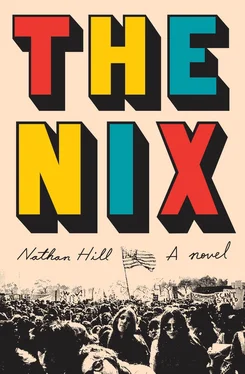All he wanted was to see her. Just a confirmation that she did, in fact, exist. That’s all he needed, and, upon seeing her, he would soon leave, long before she changed clothes and he could be accused of doing something dishonorable. Just this one thing — seeing Bethany and sharing this quiet, private moment with her — could calm him, get him through another week. That she attended Blessed Heart and not the public school, that she spent so much time in her room and so much time traveling, struck Samuel as unfair and unjust. The girls the other boys loved were always present, right there in front of them in class, right there next to them in the cafeteria. That Bethany was so inaccessible meant, to Samuel, in his head, that he was justified in occasionally spying on her. He was owed.
Then one day he was at their house when she walked right into the TV room while Bishop played Nintendo and collapsed into the same extra-large beanbag chair Samuel was at that moment sitting in. She sat in such a way that a small portion of her shoulder pressed against a small portion of his shoulder. And suddenly he felt that all the meaning in the world was concentrated in those few square inches.
“I’m bored,” she said. She wore a yellow sundress. Samuel could smell her shampoo, rich with honey and lemon and vanilla. He held himself still, afraid that if he moved she might leave.
“Want a turn?” Bishop said, shoving the controller toward her.
“No.”
“Want to play hide-and-seek?”
“No.”
“Kick the can? Red rover?”
“How could we play red rover?”
“Just throwing out ideas here. Brainstorming. Spitballing.”
“I don’t want to play red rover.”
“Hopscotch? Tiddlywinks?”
“Now you’re being stupid.”
Samuel felt his shoulder sweating where Bethany’s shoulder pressed into him. He was so rigid it hurt.
“Or those weird games girls play,” Bishop said, “where they fold up pieces of paper to find out who you’re going to marry and how many babies you’ll have.”
“I do not want to do that.”
“Don’t you want to know how many babies you’ll have? Eleven babies. That’s my guess.”
“Shut up.”
“We could play dare.”
“I don’t want to play dare.”
“What’s dare?” Samuel said.
“It’s truth or dare without the bullshit,” Bishop said.
“I want to go somewhere,” Bethany said. “For absolutely no reason. I want to go somewhere just for the point of being there and not here.”
“The park?” Bishop said. “The beach? Egypt?”
“For no other reason than to be at a place for no reason.”
“Oh,” Bishop said, “you want to go to the mall.”
“Yes,” she said. “The mall. Yes I do.”
“I’m going to the mall!” Samuel said.
“Our parents won’t take us to the mall,” Bethany said. “They say it’s cheap and vulgar.”
“I wouldn’t be caught dead wearing those clothes,” Bishop said, puffing his chest out and doing his best impression of his father.
“I’m going to the mall tomorrow,” Samuel said. “With my mom. We have to buy a new dishwasher. I’ll get you something. What do you want?”
Bethany thought about it. She looked toward the ceiling and tapped her finger on her cheekbone and thought about it hard and long before saying, “Surprise me.”
And all that night and into the following day, Samuel thought about what he could buy for Bethany. What gift would capture everything he needed to let her know? The gift needed to distill his feelings for her, give her in one small package a quick potent shot of his love and commitment and total helpless devotion.
So he knew the gift’s parameters, but he could not see the gift itself. Somewhere in the mall’s million billion shelves, the perfect gift almost certainly waited for him. But what was it?
In the car, Samuel was quiet and his mother was agitated. She always got like this on their trips to the mall. She loathed the mall, and so her critiques of what she called “suburban mall culture” grew severe and brutal whenever she actually had to go there.
They navigated out of the subdivision, onto the wider arterial road that looked like any arterial road in any American suburb: a franchise hall of mirrors. This is what you get in the suburbs, his mother said, the satisfaction of small desires. The getting of things you didn’t even know you wanted. An even larger grocery store. A fourth lane. A bigger, better parking lot. A new sandwich shop or video-rental store. A McDonald’s slightly closer than the other McDonald’s. A McDonald’s next door to a Burger King, across the street from a Hardee’s, in the same lot as a Steak ’n Shake and a Bonanza and a Ponderosa all-you-can-eat smorgasbord thing. What you get, in other words, is choice.
Or, rather, the illusion of choice, she said, all these restaurants offering substantially the same menu, some slight variation on potatoes and beef. Like at the grocery store, when she stood in the pasta aisle looking at the eighteen different brands of spaghetti. She couldn’t understand. “Why do we need eighteen spaghettis?” she said. Samuel shrugged. “Exactly,” she said. Why did we need twenty different coffees? Why did we need so many shampoos? It was easy to forget when looking at the chaos of the cereal aisle that all these hundreds of options were actually one option.
At the mall — the tremendous, bright, vast, air-conditioned cathedral of a mall — they were looking at dishwashers, but Faye was distracted by various other home appliances: something that made it easier to store leftover food; something that made it easier to grind it up; something that prevented food from sticking to the pan; something that made it easier to freeze food; something that made it easier to warm it up again. When she looked at each item she clucked a surprised Huh! and inspected it, turned it over in her hand, read the box, and said, “I wonder who thought of this?” She was wary around these things, suspicious that someone else had created a need in her or had identified a need she didn’t know she had. In the home-and-garden section it was a self-propelled lawn mower that got her attention, bright and macho-big and fantastically shiny red. “I never even thought I’d have a lawn,” she said, “and yet I suddenly want this very badly. Is that wrong?”
“No, it’s not wrong,” she said later, in one of the mall’s other kitchen stores, picking up the conversation as if she’d never stopped talking. “There’s nothing wrong with it at all. But, I don’t know. I feel like…” She paused, held some white plastic object in her hand, stared at it, some device that achieved perfectly julienned vegetables. “Doesn’t it seem absurd? That I can just buy this?”
“I don’t know.”
“Is this really me?” she said, staring at the thing cupped in her hand. “The real me? Is this who I’ve become?”
“Can I have some money?” Samuel said.
“For what?”
Samuel shrugged.
“Don’t just buy something to buy it. For the point of buying something.”
“I won’t.”
“You don’t have to buy something, is my point. Nobody really needs any of this stuff.”
She reached into her purse and produced a ten-dollar bill. “Meet me back here in an hour.”
He gripped the money in his hand and marched off into the mall’s blazing white light. The place was unknowably large. It was like a big, breathing animal. The sound of a child or children somewhere distant yelling or crying became part of the omnidirectional din: Samuel had no idea where it was coming from, where the child was, whether the child was happy or sad. It was simply a disconnected audio fact. It was inconceivable that there were not enough stores at the mall, but someone decided there needed to be even more, thus the small stand-alone kiosks that occupied the middle of every thoroughfare, selling specialized and sometimes gimmicky merchandise: little toy helicopters that the salesman demonstrated by flying them over the crowd’s worried heads; key chains with your name laser-engraved onto them; special hair-curler things Samuel couldn’t begin to understand; sausages in gift boxes; blocks of glass that appeared to have 3-D holograms inside; a special girdle that made you look thinner than you really were; hats embroidered with personalized messages while you waited; T-shirts laser-printed with your own photographs. With its hundreds of stores and booths, the mall seemed to make a simple promise: that here you would find everything you needed. Even seemingly esoteric things could be found here. Teeth whitening, for example, seemed like an unlikely mall purchase. Or Swedish massage. Or a piano. And yet you could find them all here. The mall’s overwhelmingness was meant to replace your imagination. Forget trying to dream up your desires; the mall had already dreamed them up for you.
Читать дальше












